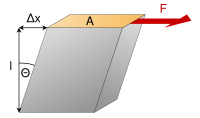
Photo from wikipedia
Concentrated solid-solution alloys (CSAs) have demonstrated promising irradiation resistance depending on their compositions. Under irradiation, various defects can be produced. One of the most important parameters characterizing the defect production… Click to show full abstract
Concentrated solid-solution alloys (CSAs) have demonstrated promising irradiation resistance depending on their compositions. Under irradiation, various defects can be produced. One of the most important parameters characterizing the defect production and the resulting defect number is the threshold displacement energies (E d). In this work, we report the results of E d values in a series of Ni–Fe–Cr concentrated solid solution alloys through molecular dynamics (MD) simulations. Based on several different empirical potentials, we show that the differences in the E d values and its angular dependence are mainly due to the stiffness of the potential in the intermediate regime. The influences of different alloying elements and temperatures on E d values in different CSAs are further evaluated by calculating the defect production probabilities. Our results suggest a limited influence of alloying elements and temperature on E d values in concentrated alloys. Finally, we discuss the relationship between the primary damage and E d values in different alloys. Overall, this work presents a thorough study on the E d values in concentrated alloys, including the influence of empirical potentials, their angular dependence, temperature dependence, and effects on primary defect production.
Journal Title: Chinese Physics B
Year Published: 2021
Link to full text (if available)
Share on Social Media: Sign Up to like & get
recommendations!